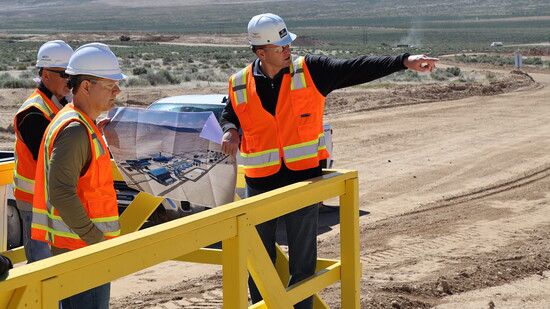Nevada is quickly becoming a key player in the future of clean energy. Leading the change is the Nevada Tech Hub and its “Lithium Loop,” a statewide system that keeps every part of the electric vehicle (EV) battery process in Nevada. From mining raw materials to building and recycling batteries, the Lithium Loop is about more than just technology. It’s a way to help grow Nevada’s economy, reduce our reliance on foreign supply chains, and invest in our local communities.
The Nevada Tech Hub is one of 31 regional partnerships chosen by the federal government to help the U.S. lead in critical technologies. By bringing together local and state government, schools, businesses, and nonprofits, Nevada is working to turn its natural resources into long-term opportunities.
So, what exactly is the Lithium Loop?
It all starts in the ground. The Silver Peak mine in Esmeralda County is currently the only active lithium mine in the U.S., and future projects at Thacker Pass and Rhyolite Ridge will continue to scale Nevada’s production. Once extracted, lithium is refined by companies like American Battery Technology Company and then sent to manufacturers, such as Dragonfly Energy, to create EV batteries. Eventually, materials from these batteries are reclaimed by recyclers like Redwood Materials, completing the “loop.”
And the benefits of this loop are big for the country, especially for Nevada.
“We’re not only creating high-quality jobs,” says Dick Bartholet, Regional Innovation Officer at the University of Nevada, Reno, “we’re also making sure people have access to the training they need to land them and have career pathways.”
That’s why the Nevada Tech Hub is investing in colleges, workforce groups, and even re-entry programs to develop a talent pipeline ready for this new, “clean energy economy.”
Beyond jobs, the Lithium Loop is designed to strengthen national security by reducing reliance on foreign materials and adding resiliency to critical supply chains. Environmentally, it enables a more full-circle, low-waste approach for producing the batteries that will power everything from cars to grid-scale energy storage.
While still in development, the Lithium Loop is already taking shape, with more than 70 consortium partners, $21 million in secured federal funding plus $7.5 million from the state, and representation across 16 of Nevada’s 17 counties. As new facilities are established in the next few years, the full loop will position Nevada not only as the lithium capital of the U.S., but as a model for regional innovation and inclusive economic growth.
“Nevada Tech Hub is about more than batteries,” Bartholet adds. “It’s about strengthening the communities we call home and making sure the clean energy transition benefits every Nevadan.”
